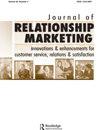企业思考:企业利益如何影响消费者对变革的规范预期
Q2 Business, Management and Accounting
引用次数: 0
摘要
摘要本研究采用了两个基于情景的实验来探索消费者在设定他们对受益于客户的公司变革的规范期望时是否“考虑到了公司”。结果表明,消费者在设定对企业应该做什么的期望时,会考虑到潜在企业行为的企业利益。即使在没有牢固的关系纽带的情况下,相关的企业利益也会增加对企业实施变革的规范期望。然而,与潜在变化相关的客户利益主导着消费者的期望,因为它通过“对客户有利的东西对公司有利”这一明显的外行信念直接或间接地影响着规范性期望。此外,潜在变化的客户和公司利益在驱动期望方面积极互动;当客户认为一项变革对他们自己和公司来说是“双赢”时,他们强烈希望公司实施这项变革。研究结果表明,公司必须明确与潜在变革相关的成本将如何由客户承担。本文章由计算机程序翻译,如有差异,请以英文原文为准。
Thinking of the Firm: How the Firm’s Benefit Influences Consumer Normative Expectations for Change
Abstract This research employs two scenario-based experiments to explore whether consumers “think of the firm” in setting their normative expectations regarding a customer-benefitting firm change. Results indicate that consumers take the firm benefit of potential firm actions into account in setting their expectations for what firms should do. Even in the absence of strong relationship ties, the associated firm benefit increases normative expectations for firms to enact a change. However, the customer benefit associated with a potential change dominates consumer expectations as it impacts normative expectations both directly as well as indirectly via an apparent lay belief that “what’s good for the customer is good for the firm.” In addition, the customer and firm benefits of potential changes positively interact in driving expectations; when customers believe that a change will be a “win-win” for themselves and the firm they strongly expect the firm to enact it. The findings suggest that firms must make clear how the costs associated with a potential change will be borne by their customers.
求助全文
通过发布文献求助,成功后即可免费获取论文全文。
去求助
来源期刊

Journal of Relationship Marketing
Business, Management and Accounting-Marketing
CiteScore
10.20
自引率
0.00%
发文量
7
期刊介绍:
The Journal of Relationship Marketing is a quarterly journal that publishes peer-reviewed (double-blind) conceptual and empirical papers of original works that make serious contributions to the understanding and advancement of relationship and marketing theory, research, and practice. This academic journal is interdisciplinary and international in nature. Topics of interest (not limited to): Evolution and life cycle of RM; theoretical and methodological issues in RM; types of RM, networks and strategic alliances; internal communication, quality, trust, commitment, satisfaction, loyalty, and dissolution in RM; applications of RM in different disciplines and industries; international perspectives in RM; RM strategies in services economy, higher education, and e-commerce; RM, technology, and the Web; profitability and RM; case studies and best practices in RM. If you are interested in becoming an ad-hoc reviewer, please e-mail a brief statement indicating your area of expertise and interest along with a copy of your CV.
 求助内容:
求助内容: 应助结果提醒方式:
应助结果提醒方式:


